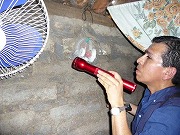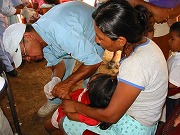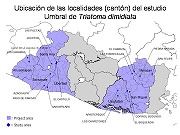- Home
- Technical Cooperation Projects
- Index of Countries
- Latin America
- El Salvador
- Chagas Disease Control Project Phase 2
- Project News
- A Study on the Threshold of Triatoma dimidiata Domestic Infestation Rate
Project News
2008-09-29
A Study on the Threshold of Triatoma dimidiata Domestic Infestation Rate
Seven Central American countries and PAHO jointly launched the Initiative of the Central American Countries for the Control of Chagas Disease (IPCA) in 1997. The IPCA is aimed at eliminating Chagas disease transmission in endemic areas of Central America by 2010. The JICA Project has been implemented to assist El Salvador and Honduras in achieving the IPCA goal.
One of the indicators for determining the elimination of Chagas disease transmission is the domestic infestation rate of the vector bugs. However, with regard to Triatoma dimidiata (T.d.), one of several species of vector bugs, the threshold below which the domestic infestation rate should be controlled has not been scientifically determined. Implementation of interventions without the threshold rate is like navigation without a map. This situation has been making it very difficult to correctly determine whether or not transmission of Chagas through T.d. bugs has been eliminated.
Therefore, a study aimed at identifying the threshold rate of T.d. domestic infestation has been incorporated into the project activities. The study was designed in an inter-disciplinary manner (i.e., a combination of epidemiological and entomological methods) by the joint efforts of the Ministries of Health of El Salvador and Honduras, JICA, PAHO, WHO, and the London School of Hygiene and Tropical Medicine.


This study on the threshold rate of T.d. domestic infestation will serve as a useful tool for: (i) more accurate monitoring and evaluation of the project; (ii) sustainable operation of the community-based participatory surveillance system; and (iii) saving resources such as insecticides and personnel for spraying. Last but not least, JICA’s commitment to the study of the T.d. domestic infestation rate is considered by WHO as a significant technical contribution to development of an international standard.
The study analyzes the relationship between the domestic infestation rate of T.d. and the seroprevalence of children under 16 years old. In El Salvador, 16 communities (area shown by blue spot) are selected as study area from 7 Department (area shown as purple) are selected as study areas, and a total of 1,495 houses and 2,585 persons aged less than 16 years are involved in the study.
- About JICA
- News & Features
- Countries & Regions
- Our Work
- Thematic Issues
- Types of Assistance
- Partnerships with Other Development Partners
- Climate Change / Environmental and Social Considerations
- Evaluations
- Compliance and Anti-corruption
- Science and Technology Cooperation on Global Issues
- Research
- JICA Development Studies Program / JICA Chair
- Support for the Acceptance of Foreign HRs / Multicultural and Inclusive Community
- Publications
- Investor Relations

